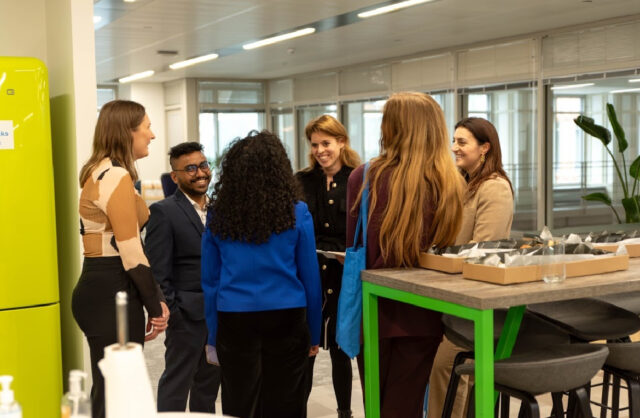Aglaia Freccero, a PhD student at Imperial College London, joined HRH Princess Beatrice, Chegg, Student Minds, the Mental Health Foundation, Big Change, and fellow student advocates to discuss how UK universities can meaningfully support all students’ mental health, as part of Student Mental Health Week 2024.
Aglaia Freccero, who is studying for a PhD in Clinical Medicine Research (Brain Sciences) at Imperial College London, joined HRH Princess Beatrice, online learning platform Chegg, Student Minds, the Mental Health Foundation, and Big Change, for an intimate dialogue how UK higher education can promote student mental health, taking into account their unique needs and circumstances, including those of neurodiverse learners. The discussion was held as part of Student Mental Health Week 2024, a global initiative spearheaded by US edtech company Chegg, in partnership with esteemed non-profits and organisations from around the world.
Aglaia attended the event, which took place in London on 28 February, as a member of Student Minds’ Student Advisory Committee. A passionate and award-winning mental health advocate, she currently holds the position of Mental Health Officer at Imperial College Union, where she co-leads the creation and implementation of Imperial’s first institutional mental health strategy. She is a member of the Lived Experience Advisory Board at Rethink Mental Illness and a past member of the Young People’s Strategy Steering Group at Mind. Aglaia is a President’s PhD Scholar in the Division of Psychiatry, and her research investigates the potential use of AI interventions to support adolescents’ mental health in schools.
HRH Princess Beatrice shared her own experiences of neurodiversity, having been identified as dyslexic aged seven. She highlighted the importance of taking into account all students’ unique needs when addressing their mental health.
The thoughtful discussion delved into how educators and policymakers can better understand the worsening mental health crisis for students. It comes as the recent Chegg.org Global Student Survey revealed that 66% of UK university students say they are not sleeping enough, 62% have experienced daily feelings of anxiety, and 56% have experienced academic burnout.
Topics explored during the roundtable include the lessons that Covid lockdowns taught universities on their mental health approach, current examples of universities effectively supporting student mental health, and what universities can do to meaningfully engage with students to raise awareness. Following the discussion, Chegg plans to publish a white paper with recommendations of how the UK higher education sector and policymakers can best support student mental health.
HRH Princess Beatrice, said, “Embracing neurodiversity is not just a commitment to inclusivity, but a catalyst for innovation and progress. Today’s roundtable highlighted the importance of standing united in our pursuit to cultivate an environment where every student, regardless of their neurological makeup, can thrive in their studies and beyond. I would like to thank Chegg and all its partners for organising Global Student Mental Health Week to help destigmatise this important issue.”
“We are deeply honoured that HRH Princess Beatrice, Big Change, Student Minds, the Mental Health Foundation, and the inspiring student advocates took the time to share their meaningful contributions and thoughtful insights to this roundtable discussion,” said Heather Hatlo Porter, Head of Chegg.org and Chief Communications Officer of Chegg, Inc. “The need to elevate conversations about mental health has never seemed more urgent and our resolve has never been stronger. By continuing to promote a dialogue between diverse voices from across the world, we hope to show that mental health is an issue that affects us all, and it must be at the top of the global policy agenda. Although today’s students live in the most connected era in history, many experience a deep sense of disconnection, feeling lonely and struggling to make friends.”
Aglaia Freccero, a PhD student at Imperial College London, said, “I was honoured to take part in this important roundtable on student mental health. Thank you to HRH Princess Beatrice, Chegg, Student Minds, Big Change, the Mental Health Foundation, and my fellow student advocates for sharing their experiences. This discussion was an important reminder that listening to student voices is essential if we are to enact policies to meaningfully support mental health in higher education.”
Student Mental Health Week is a global initiative created by Chegg in 2023 that seeks to destigmatise mental health among students, encourage young people to be intentional about looking after themselves, and inspire conversations around what policymakers, education institutions, the wider community, caregivers, and learners themselves can do to support student mental wellness.
Student Mental Health Week 2024, which took place from 26 February to 3 March, has a special focus on tackling student loneliness. The World Health Organization has deemed social isolation an issue and a global health priority, and warned of the impact of loneliness on well-being.
The non-profits and organizations from around the world that Chegg has partnered with for this year’s Student Mental Health Week include Active Minds, the Ayrton Senna Institute, Born This Way Foundation, Calm, the Coalition to End Social Isolation and Loneliness, Inspiring Children Foundation, The Jed Foundation (JED), Mabasta, the Mental Health Literacy Collaborative, Mindcafe, the National Alliance on Mental Illness, the Nivishe Foundation, Ontario Undergraduate Student Alliance, ONYX Mental Health Family, Orygen, #SameHere, “Seize the Awkward” from the American Foundation for Suicide Prevention and JED with the Ad Council, Student Minds, the Varkey Foundation and Young Invincibles.
Activities that kicked off globally during the week of February 26-March 3, 2024:
Chegg brought together the mental health resources from these collaborative partners, including simple tips to improve mental wellness, under a centralised online resource, and signposted the support available to its millions of students worldwide, via the Student Mental Health Week website.
Student Mental Health Week encompassed a variety of in-person and digital events, involving students to inform debate and help educate policymakers, educational institutions, and communities on the mental health challenges students face.
Chegg worked with students around the world to find opportunities to have their voices heard by elite decision-makers and influencers. This included meetings on Capitol Hill with lawmakers and officials from the U.S. Department for Education, in partnership with Young Invincibles.
Finalists of the Chegg.org $100,000 Global Student Prize and the $1 million Global Teacher Prize shared how they look after their mental wellness, which resources they turn to for support, facts about student mental health in their country, and projects they are involved with on the ground.
Chegg’s Center for Digital Learning launched a white paper based on global research on the mental health of students around the world.
Calm, a Chegg partner and the world’s number one app for sleep, meditation and relaxation, curated a collection of guided meditations for anxiety and stress for students.




